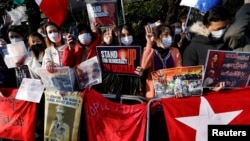Human rights activists are pushing for the United Nations Security Council to refer Myanmar junta officials to the International Criminal Court, citing what the activists say are ongoing abuses in the Southeast Asian nation.
The comments coincided with a Security Council meeting Monday on the Myanmar crisis.
Human Rights Watch said in a statement that more concrete action needs to be taken against the junta, which seized power more than two years ago, overthrowing the democratically elected government of Aung San Suu Kyi. The military coup sparked mass unrest involving the country’s armed forces, as well as a resistance movement made up of protesters, activists, ousted politicians and an armed wing.
Thousands have been arrested or killed in a military crackdown, according to the latest data from a Thailand-based monitoring group.
The February 1, 2021, coup happened after the military rejected the outcome of November 2020 elections, in which Suu Kyi's National League for Democracy party won in a landslide. The junta claimed widespread electoral fraud, allegations denied by the civilian electoral commission before it was disbanded.
Human Rights Watch is urging the Security Council to build on a December resolution, which demanded an immediate end to the violence and that the junta free all political prisoners, including Suu Kyi and former President Win Myint, who also was ousted. Myanmar is under international sanctions.
“Myanmar’s junta has demonstrated it is impervious to statements of condemnation or concern. Its disregard of the Security Council’s December resolution shows the need for a new resolution imposing strong measures like an arms embargo and targeted sanctions for senior military officials and companies linked to the military,” said Louis Charbonneau, U.N. director at Human Rights Watch.
The council also has called for Myanmar’s democratic institutions to be restored.
On Monday, the U.N.’s special envoy for Myanmar, Noeleen Heyzer, and Indonesian Foreign Minister Retno Marsudi led a closed-door meeting at U.N. headquarters in New York. Reports say Heyzer likely updated council members about the current situation on the ground in Myanmar, which has seen no letup in conflict since the adoption of the December resolution.
Kyaw Moe Tun, the current Myanmar permanent representative to the U.N., told VOA’s Burmese service that he was frustrated at the lack of progress the resolution has brought, but he hoped for a tangible outcome from Monday’s meeting.
The representative said, “There is no action if the resolution is not implemented, so what is the next step?”
He said the Security Council should take action against the Myanmar military if it fails to comply with the resolution.
May Sabe Phyu, director of the Gender Equality Network, a coalition of organizations advocating for women’s rights in Myanmar, tells the Associated Press the junta has conducted a terror campaign and committed “heinous acts” that constitute crimes against humanity.
Phyu also criticized U.N envoy Heyzer for meeting with Myanmar military chief Min Aung Hlaing and not with the National Unity Government, which was formed by ousted politicians and regional leaders amid the coup, and says it is Myanmar’s legitimate government.
As it stands, all plans to end the crisis have failed to have the desired effect.
The Association of Southeast Nations (ASEAN), a political and economic union of 10 member states in Southeast Asia, adopted a five-step consensus in April 2021 in an attempt to restore peace in Myanmar.
Although Myanmar agreed to the plan, little action was taken, leading to the exclusion of Myanmar’s military leaders from meetings with ASEAN members. Indonesia is ASEAN's current chair, which rotates annually among the member nations.
Charbonneau added in the Human Rights Watch report that Myanmar’s General Min Aung Hlaing has rejected the ASEAN consensus plan. Charbonneau called for Heyzer and Marsudi to push for further punishments.
“The U.N. special envoy and Indonesian foreign minister should make clear to Security Council members that the junta’s killings, torture, unlawful arrests and war crimes demand more targeted action. Cutting off the junta’s supply of money and weapons is a critical next step to stanch the atrocities being carried out every day in the country."
China, India and Russia abstained from December’s resolution vote, but 12 of the 15-member council voted in favor, so the motion was adopted. China and Russia are two of the five permanent Security Council members and have long opposed tough action over Myanmar.
Aung Thu Nyein, a political analyst, believes efforts made by the U.N. and ASEAN have “little leverage” on Myanmar’s issues.
“U.N. is so inefficient as Russia’s aggression against Ukraine has shown as evidence. U.N special envoy on Myanmar, Ms. Noleen Heyzer’s visit was ended, rebuffing a long statement by the junta,” he told VOA. “U.N. as well as ASEAN has little leverage to do with Myanmar’s crisis. If all special envoys on Myanmar, particularly China, Japan, ASEAN and other regional powers can work together, it may drive the junta [to stop].”
Some information for this report comes from The Associated Press.
VOA’s Burmese service contributed to this report.





